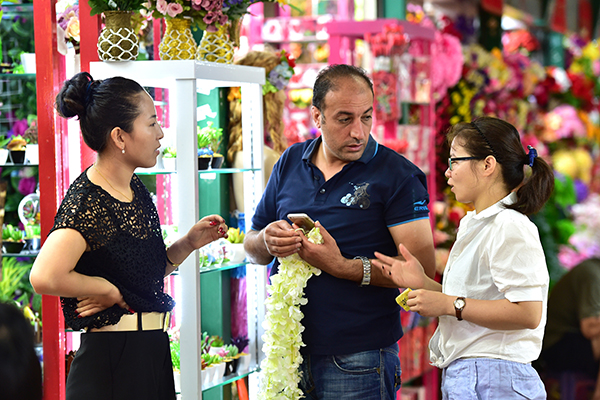A Brazilian businessman (center) shops at a market in Yiwu, Zhejiang province. [Photo provided to China Daily]
City becomes the center of EUBs business for companies in Brazil

The scale of the operation is immense. About 20,000 ePacket parcels, or EUBs, are delivered to Brazil every day from Yiwu, a wholesale commodity provider in the coastal province of Zhejiang.
Yiwu has been named by the United Nations, the World Bank and JP Morgan, among others, as the "largest small commodity market" in the world, attracting a huge number of international buyers.
"Most commodities sold along Sao Paulo's famous March 25 Street shopping district come from Yiwu," Qiu Genjun, general manager of China Express Latin America Co Ltd, said.
In Brazil, EUBs are the result of close cooperation between China Post and Brazilian Post.
Compared to $76-per-kilogram for UPS and $110 for DHL to transport parcels from Beijing to Sao Paulo, it only costs $22 per kg using China Post's airmail service.
The other advantages also include lower odds of package loss and faster customs clearance. EUBs have become a favored delivery method for AliExpress, of China's Alibaba Group Holding Ltd, which has operated in Brazil since 2013 and has scored impressive results.
By the end of last year, AliExpress had been well ahead of the second-place B2W, a traditional Brazilian e-commerce group, and become the largest platform of its kind in the country, according to media reports. Last year marked a good one for e-commerce development in Brazil, with trade volume surging 24 percent to 35.8 billion reais ($9.09 billion), a study revealed.
A report released by information company, E-bit, in February predicted e-commerce sales would reach 43 billion reais by the end of this year.
Brazil recorded 10 million first-time online shoppers in 2014, bringing the total number of Internet customers in the country to 61.6 million, according to E-bit data.
"Despite the rapid growth, the sector still faces challenges, including a complex legal system and poor logistics," Michael Lee, Alibaba's head of international marketing and business development, said.
Language is also a main obstacle of the fast-growing e-commerce market in Brazil.
For example, although AliExpress has a website in Portuguese, Brazilian shoppers still need to use English or translation softwares when they want to communicate with Chinese sellers for more details.
Tariff policies thwart the development of the sector as well. The Brazilian government requires buyers to pay a 60-percent import duty on the cost and insurance value of imported goods unless the cost insurance freight is below $50. "This makes many Chinese commodities more expensive than local ones and strips their competitive advantage," Lee said.
